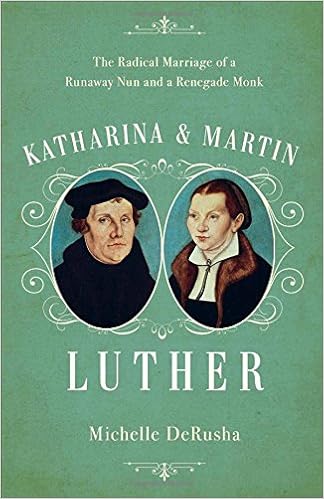With only 8 letters of Katharina (von Bora) Luther that has come down to historians there is a hard time to figuring out important things about her early life and the day to day of their marriage. There are copious amounts of letters from Martin (and correspondence among his friends) though, and a piecing together of their lives is possible and I believe that DeRusha does a fantastic job weaving their narrative together while showing little peeks at Luther's theology as it is developing along side some very important and interesting historical bits and bobs that shed even more light on what their lives might have been like. Things like late medieval pregnancy and delivery books to how the lives of women in convents was often very socially mobile really give a glimpse into something past the big theological and political climate that we are used to reading when we read Reformation history.
They say when doing something like this to list a positive, then a negative, then a positive. Here is my "negative". I really wish that it read a bit more like a narrative. It is a fantastic book that is filled with narrative sprinkled with historical asides that are fascinating and eye opening. But when I think of narrative-style history books I think of something that reads and feels like you are instead of looking in from the outside. I think DeRusha tries to invite you into the Black Cloister (the Luther home, awesome name isn't it?) but I think that you are left in the parlour instead of welcomed in to sit at the table to experience a dinner with Martin Luther and all of the students and politicians and theologians eating and conversing with him.
Aside from that one thing, I think this is a fantastic book that also has the potential to show all of these major players at the beginning of the Reformation in a much more human light. They were groundbreaking theologians that were working on reforming the Church and taking her back to Scripture, but just like us they faced debt, bills, deaths of children, they had problem family members and went through human problems. They weren't simply theological machines. This book shows us that these major historical and theological players in one of the greatest and most trying moments in history were real people, and in the case of Martin and Katharina Luther, a real--and radical--marriage.
You can pick up your own copy here
